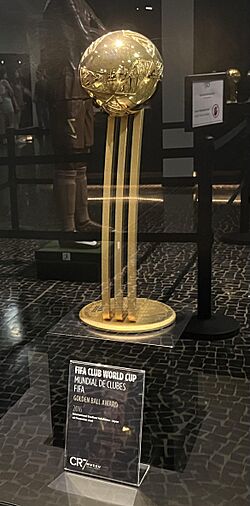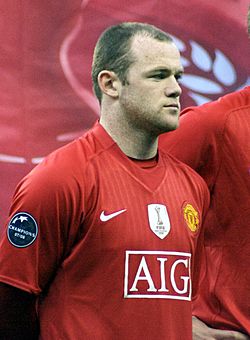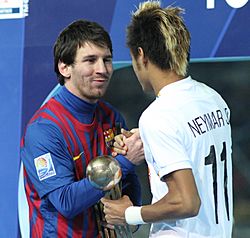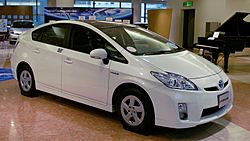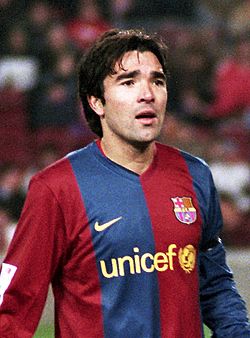FIFA Club World Cup awards facts for kids
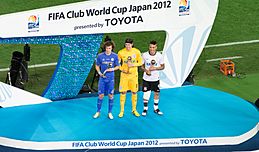
David Luiz, Cássio and Paolo Guerrero (from left to right) accepting their individual awards after the 2012 FIFA Club World Cup final.
|
|
| Founded | 2000 |
|---|---|
| Region | International (FIFA) |
The FIFA Club World Cup is a big international soccer tournament. It's organized by FIFA, which is the main group for soccer around the world. The competition first started in 2000. It took a break between 2001 and 2004 because of some problems.
The tournament came back in 2005 with a new plan. It also took the place of an older competition called the Intercontinental Cup. The name changed to FIFA Club World Cup the next year.
Since 2025, the tournament has a new setup. Now, 32 teams from all over the world play for the title. These teams come from different regions: 12 from Europe, 6 from South America, 4 from Asia, 4 from Africa, 4 from North, Central America and Caribbean, 1 from Oceania, and 1 team from the country hosting the event.
The teams are put into eight groups of four. Each team plays three games in their group. The top two teams from each group move on to the knockout stage. This part starts with the round of 16 and ends with the final match.
At the end of each tournament, special awards are given to players and teams. These awards celebrate those who played really well or showed great sportsmanship. Spanish club Barcelona is the only team to have won every award in one tournament. This happened in 2015. Barcelona and Real Madrid are also the only teams to have won the FIFA Fair Play Trophy three times. Lionel Messi is the only player to have won the Golden Ball award twice. Uruguayan player Luis Suárez scored the most goals in one tournament, with five goals in 2015.
Contents
Awards in the FIFA Club World Cup
There are three main awards given out today:
- The Golden Ball is for the best player in the whole tournament.
- The Man of the Match award goes to the best player in each game. This award started in 2013.
- The FIFA Fair Play Trophy is for the team that shows the best sportsmanship.
Two awards are no longer given out:
- The Golden Shoe was for the top goal scorer. It was only given in 2000.
- The FIFA All-Star Team was a list of the best players in the tournament. It was also only given in 2000.
The team that wins the competition also gets the FIFA Club World Cup Champions Badge. This badge has a picture of the trophy. The winning team can wear it on their jerseys until the next tournament's final. Milan was the first team to get this badge after winning in 2007.
Players from the teams that finish third, second, and first also receive medals. They get bronze, silver, and gold medals, respectively.
Golden Ball: Best Player Award
The Golden Ball award goes to the best player in each FIFA Club World Cup. A special committee chooses a few top players. Then, media members vote for the winner. The players who come in second and third place get the Silver Ball and Bronze Ball awards.
Here are some interesting facts about the Golden Ball:
- Real Madrid has won the Golden Ball award five times. Their winners include Sergio Ramos (2014), Cristiano Ronaldo (2016), Luka Modrić (2017), Gareth Bale (2018), and Vinícius Júnior (2022).
- Barcelona is the only club to have won every award in one tournament. This happened in 2015 in Japan.
- Lionel Messi is the only player to have won the Golden Ball twice.
- Cristiano Ronaldo has won the most awards overall (4). He has one Golden Ball and three Silver Balls.
- Brazilian players have won the most Golden Balls, with seven wins. They also have the most Silver (six) and Bronze (five) Balls.
- Some players from outside Europe and South America have also won Silver or Bronze Balls. These include Cristian Bolaños, Dioko Kaluyituka, Mouhcine Iajour, Gaku Shibasaki, and Ivan Vicelich.
| Edition | Golden Ball | Silver Ball | Bronze Ball | Ref(s) |
|---|---|---|---|---|
| 2000 Brazil | ||||
| 2005 Japan | ||||
| 2006 Japan | ||||
| 2007 Japan | ||||
| 2008 Japan | ||||
| 2009 United Arab Emirates | ||||
| 2010 United Arab Emirates | ||||
| 2011 Japan | ||||
| 2012 Japan | ||||
| 2013 Morocco | ||||
| 2014 Morocco | ||||
| 2015 Japan | ||||
| 2016 Japan | ||||
| 2017 United Arab Emirates | ||||
| 2018 United Arab Emirates | ||||
| 2019 Qatar | ||||
| 2020 Qatar | ||||
| 2021 United Arab Emirates | ||||
| 2022 Morocco | ||||
| 2023 Saudi Arabia | ||||
| 2025 United States |
From 2005 to 2021, the Golden Ball winner also received a special trophy from the tournament's sponsor. This stopped after the 2022 tournament. The award had different names over the years. For example, from 2005 to 2014, it was called the Toyota Award. During that time, the winner even got a Toyota car!
Man of the Match: Top Player in Each Game
The Man of the Match award started in 2013 in Morocco. This award is given to the best player in each game of the tournament. A special group of FIFA experts decides who gets it.
Six players have won this award twice:
- Four players won two awards in the same tournament: Luis Suárez (2015), Jonathan Urretaviscaya (2017), Khalid Eisa (2018), and Vinícius Júnior (2022).
- Two players won two awards in different tournaments: Luka Modrić and Cristiano Ronaldo. Both won in 2016 and 2017.
- Cristiano Ronaldo is the only player to have won the Man of the Match award twice in the final game.
| Final | Player of the Match | Ref(s) |
|---|---|---|
| 2013 Morocco | ||
| 2014 Morocco | ||
| 2015 Japan | ||
| 2016 Japan | ||
| 2017 United Arab Emirates | ||
| 2018 United Arab Emirates | ||
| 2019 Qatar | ||
| 2020 Qatar | ||
| 2021 United Arab Emirates | ||
| 2022 Morocco | ||
| 2023 Saudi Arabia | ||
| 2025 United States |
The name of the Man of the Match award has changed over time. This depended on which company was sponsoring the tournament. For example, from 2013 to 2014, it was called the Toyota Match Award. Since 2022, it has been called the Man of the Match presented by Visit Saudi.
FIFA Fair Play Trophy: Playing Fair
The FIFA Fair Play Trophy is given to the team that shows the best fair play during the Club World Cup. Teams that win this award get a special diploma and a fair play medal for each player and official. They also receive $50,000 worth of soccer equipment. This equipment is used to help young players develop their skills.
Real Madrid is the only club to have won the FIFA Fair Play Trophy four times.
| Edition | FIFA Fair Play Trophy Winners | Ref(s) |
|---|---|---|
| 2000 Brazil | ||
| 2005 Japan | ||
| 2006 Japan | ||
| 2007 Japan | ||
| 2008 Japan | ||
| 2009 United Arab Emirates | ||
| 2010 United Arab Emirates | ||
| 2011 Japan | ||
| 2012 Japan | ||
| 2013 Morocco | ||
| 2014 Morocco | ||
| 2015 Japan | ||
| 2016 Japan | ||
| 2017 United Arab Emirates | ||
| 2018 United Arab Emirates | ||
| 2019 Qatar | ||
| 2020 Qatar | ||
| 2021 United Arab Emirates | ||
| 2022 Morocco | ||
| 2023 Saudi Arabia | ||
| 2025 United States |
Golden Shoe: Top Goalscorer Award
The Golden Shoe award was given to the player who scored the most goals in the FIFA Club World Cup. This award was only given at the very first tournament in 2000. If players scored the same number of goals, the award went to the player with the most assists. The second and third best goalscorers received the Silver and Bronze Boots.
| Edition | Golden Shoe | Silver Shoe | Bronze Shoe |
|---|---|---|---|
| 2000 | 3 goals, 0 assists |
N/A | 2 goals, 1 assist |
FIFA All-Star Team: Best Players Squad
The FIFA All-Star Team was a list of the best players from the tournament. This award was also only given at the first tournament in 2000. The team included eleven starting players and seven substitute players.
| Edition | Goalkeepers | Defenders | Midfielders | Forwards |
|---|---|---|---|---|
| 2000 |
|
|
||
| Substitutes | ||||
|
|
|||
Hat-tricks: Scoring Three Goals
A hat-trick is when one player scores three goals in a single game. Luis Suárez, Cristiano Ronaldo, Gareth Bale, and Hamdou Elhouni are the only players who have scored a hat-trick in this competition.
- Suárez scored his hat-trick in the 2015 semi-final against Guangzhou Evergrande. He scored all three goals for his team in that match.
- Cristiano Ronaldo scored a hat-trick in the 2016 final against Kashima Antlers. He scored a penalty kick to tie the game, then two more goals in extra time.
- Gareth Bale scored his hat-trick in the 2018 semi-final, also against Kashima Antlers. He scored all three of his team's goals before leaving the game early.
- Hamdou Elhouni scored the most recent hat-trick in 2019. This happened when Espérance de Tunis won 6–2 against Al-Sadd in the match for fifth place.
See also
 In Spanish: Anexo:Premios de la Copa Mundial de Clubes de la FIFA para niños
In Spanish: Anexo:Premios de la Copa Mundial de Clubes de la FIFA para niños
 | Emma Amos |
 | Edward Mitchell Bannister |
 | Larry D. Alexander |
 | Ernie Barnes |


